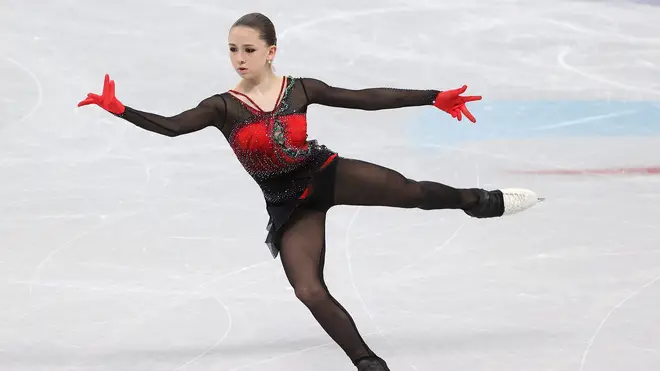
Nick Ferrari at Christmas 1pm - 3pm
11 February 2022, 10:57 | Updated: 11 February 2022, 12:22

Urgent hearing to decide fate of Russian figure skater after failing drug test
A teenage Russian skating superstar has plunged the Winter Olympics into a doping scandal over a failed drugs test.
Kamila Valieva, 15, tested positive for banned substance TMZ - an angina medication that increases blood flow to the heart and stabilises blood pressure - on February 8, based on a sample taken on Christmas Day during Russia's annual Figure Skating Championships.
Valieva was automatically suspended by Russia's state anti-doping agency RUSAD after the December 25 test - but it decided to lift the suspension on February 9 when she appealed, clearing her to compete in the single's event next week.
Olympic organisers have now appealed that decision to the Court of Arbitration for Sport, and are pressuring judges to give a ruling before February 15 when Valieva is next due to compete.

The test result, which was reported by a World Anti-Doping Agency lab in Sweden, came back a day after she won gold in the team figure skating event on February 7 but before the medal ceremony took place.
She had won the hearts of the world after becoming the first woman to land a historic quad at the Games.
Today it emerged the medal ceremony has been delayed as a result and whether or not the team gold will be allowed to stand will be decided later - a process that may take several months to complete.
Valieva took to the rink for practice on Friday, which Russian officials said went "worse than usual" because she is in 'a bad mood' over the doping case.
Olga Yermolina, spokeswoman for the Russian Figure Skating Federation, said: "She is nervous, which is understandable.
"She is not in an information vacuum [over the doping allegations]. 'Proceedings may take several months, and the team medals will be awarded after the [hearing on her case]. Kamilla is in a bad mood."
Yermolina even went so far as to suggest some kind of foul play by anti-doping authorities in revealing the positive result in the midst of competition.'
"Do you know when the test was taken? Why do you think it was published right now, compare these dates and draw your own conclusions,' she said.'I cannot comment directly and tell you clearly, but just compare the dates and you will understand what is at stake, why this is happening."
Stanislav Pozdnyakov, president of the Russian Olympic Committee, added: "I have serious questions about the time that passed between 25 December, when the sample was submitted in St Petersburg, and 8 February, when it was made public."
A spokesperson for the International Testing Agency said: "Under the World Anti-Doping Code, the World Anti-Doping Agency (WADA), the International Skating Union (ISU), RUSADA and the IOC have a right to appeal the decision to lift the provisional suspension before the Court of Arbitration for Sport (CAS).
"The IOC will exercise its right to appeal and not to wait for the reasoned decision by RUSADA, because a decision is needed before the next competition the athlete is due to take part (in Women Single Skating on 15 February).
"Following the delegation of the IOC’s anti-doping program in relation to the Olympic Games to the ITA, the ITA will lead the appeal before CAS on behalf of the IOC."
Russia is already under heavy sanction by Olympic organisers after it was revealed in 2016 that the country had been running a state-sponsored doping programme since at least 2011 covering the 'vast majority' of summer and winter Olympic sports.
Officially, Russia is banned from competing at the Olympics: Its athletes have to take part as the 'Russian Olympic Committee', must wear a neutral flag on their uniforms, and cannot play their anthem at medal ceremonies if they win gold.